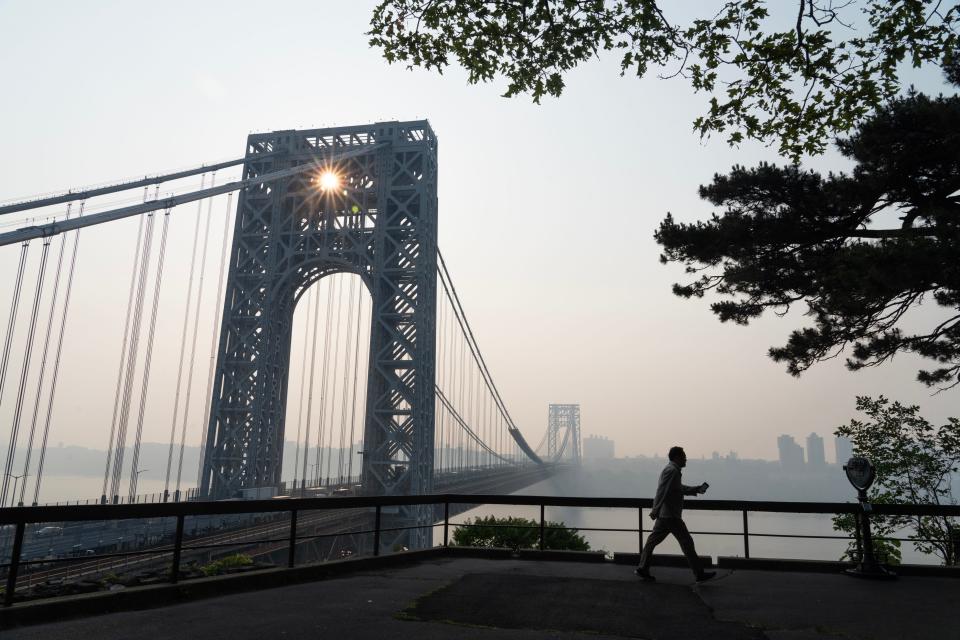NJ smoke conditions improve but remain unhealthy in day 3 of haze from Canadian wildfires
- Oops!Something went wrong.Please try again later.
New Jersey's air quality began improving late Thursday morning after reaching hazardous conditions Wednesday from an unprecedented amount of smoke that descended on the region from Canadian forest fires. But pollution levels were still very high as of midday and the state was under a red alert.
Hours earlier, almost all of New Jersey was under a purple alert - the second highest level that marks very unhealthy conditions for the general public.
Air quality index readings were between 226 and 290 in all but one area of the state. Unhealthy air for the general population begins at 151. The lowest reading in New Jersey was at the Delaware Water Gap, at 171.
By late morning, conditions had improved somewhat and much of the state was under a red alert. Pollution readings were about half of what they were at the height of the event Wednesday afternoon when a thick plume of smoke shrouded the region in darkness and caused air quality index scores to soar to unheard of hazardous conditions.
The numbers were lower than Wednesday evening when New Jersey reached historically bad conditions with index scores above 300, which are considered hazardous.
Today's smoke forecast
The smoke is expected to remain "locked in" the region for much of Thursday, said Jim Connolly, a meteorologist at the National Weather Service in Brookhaven, New York.
A low-pressure system that has funneled the smoke into the metropolitan area has shifted slightly. That may mean the extraordinarily thick plumes of smoke that arrived in the region on Wednesday afternoon may bypass northern New Jersey and instead hit South Jersey and the Philadelphia region harder, Connolly said.
More: Canada wildfires are turning North Jersey skies orange. Here's our complete coverage
Conditions are expected to improve after midnight and into Friday but the region will still likely have air quality issues going into the weekend. "Hopefully today is the worst of it," Connolly said.
At a news conference Thursday morning in Newark, Gov. Phil Murphy said New Jerseyans should still try to remain indoors for much of the day especially those with chronic lung conditions.
Health impacts
Hospitals saw a slight increase in the number of people entering emergency rooms with respiratory issues on Wednesday. About 143 people sought care for asthma attacks - the highest amount since high pollen days two months ago, said Health Commissioner Judy Persichilli.
Pulmonologists caution that those who have chronic lung or heart disease will be at greater risk in the days to come if the smoke doesn't dissipate.
"The longer this lasts, the greater the risk becomes," said Dr. Eric Costanzo, a pulmonologist and chief of critical care at Jersey Shore University Medical Center. "We haven't had a lot of activity in our emergency department but that's something that may change over the next 24, 48 hours."
The smoke comes from 200 forest fires mostly in Quebec that firefighters are having trouble containing. Murphy was in contact with Canadian officials Wednesday. He said 10 to 12 million acres had already burned. “The scale of this is extraordinary,” Murphy said.
How long is the wildfire smoke going to last?

Meteorologists say the weather pattern may not change until Saturday. If the fires continue to rage, that means the smoke will continue to pour in for the next several days.
Schools and other organizations have canceled most outdoor activities on Thursday. A few school districts are closed and others have early dismissal.
The smoke entered the region early Tuesday. By the end of the day, pollution became so bad that it prompted a rare red alert. It soared on Wednesday to historic hazardous conditions and has gone down Thursday morning but still remains unhealthy to the general public.
Check back for more updates throughout the day.
This article originally appeared on NorthJersey.com: Will the smoke be worse today in NJ? Air quality update

